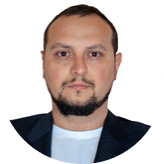
Catalysts Webinar | Catalysis for Environmental Remediation
15 January 2021, 00:00
Catalysis, Environmental Applications, CO2, valorization, Photocatalysis, Ozonization, Water contaminants
Webinar Information
4th Catalysts Webinar
Catalysis for Environmental Remediation
The ever growing environmental pollution has stimulated the rapid development of environmental catalysis in recent years. Environmental catalysis is a multidisciplinary research field in which chemists, materials scientists, as well as environmentalists are involved. Their efforts are focused in improving human health and life quality through environmental remediation. In this regard, the progress in synthesis of new catalytic nanosized materials, advanced characterization techniques (i.e. electron microscopy, spectroscopy, etc.) and high-level analytical chemistry combined with computational studies have revealed as the main drivers for generation of clean energy as well abatement of major pollutants in air (i.e. NOx, CO2, …) and water. The current webinar will show through two lectures of two specialists in the respective topics how catalysis is applied as a powerful tool for environmental remediation. On one side, Prof. Eduardo-Garcia Verdugo Cepeda will show us a way of reducing the environmental impact of greenhouses through valorization of CO2 (that is transformation of CO2 into high-value products). On the other hand, in a second lecture, Dr. Manuel Checa-Gómez will illustrate us about the removal of contaminants (i.e. most of them of pharmaceutical origin) from water through advanced oxidation processes (i.e. ozone, visible LED radiation, etc…).
Date: 15 January 2021
Time: 11.00am CET
Chair: Dr. Maria José Sabater
Webinar ID: 824 4106 2262
The following experts will present and speak:
|
Dr. Maria José Sabater, Universitat Politècnica de València, Spain |
Dr. Maria José Sabater is a Tenured Scientist at the Universitat Politècnica de València -Spanish National Research Council (CSIC). She obtained her degree in Pharmacy from Universidad de Valencia (Spain) in 1987 and her Ph.D. in Organic Chemistry from the same University in 1991. After completing her doctorate, she joined the group of Prof. Waldemar Adam at the Würzburg University (Germany) as a post-doctoral fellow of the Alexander von Humboldt Foundation, focusing her studies on photochemistry (1993-1994). Thereafter she moved to Poitiers University (France), being sponsored with a post-doc fellowship from the European Union´s Human Capital and Mobility Program under the supervision of Prof. Michel Guisnet (1995). This time her research was focused on heterogeneous catalysis for fine chemicals. In early 1996, she returned to Spain and joined at the Institute of Chemical Technology (UPV-CSIC) as scientific researcher with a tenure-track position (5 years) belonging to the Reincorporation Program for Doctors and Technologists (Ministry of Education, Science and Innovation). In 2002 she was appointed Tenured Scientist at the Spanish National Research Council (CSIC) as a staff member of the Institute of Chemical Technology. Her current research interests include catalysis, nanotechnology in catalysis and new materials. She is author of publications (including articles, conference proceedings and book chapters) on carbocationic chemistry, photochemistry, new materials and catalysis. On the applied side, she holds several international and national patents and licensed technologies. |
|
Prof. Dr. Eduardo Garcia-Verdugo Cepeda, University Jaume I, Spain |
Eduardo García-Verdugo Cepeda is a Full Professor in Organic Chem. at University Jaume , Castellon (Spain) and “Investigador Cientifico” (Permanent civil servant Science Research position of CSIC) at Instituto de Catalisis y Petroleoquimica (Madrid). He obtained his Ph.D. degree (with European Mention) in chemistry at the Jaume I University Castellon (Spain). During his M.Sc. and Ph.D. (1996–2001), he worked in the field of asymmetric synthesis and heterogeneous catalysis. After his Ph.D., he moved to work with one of the world leaders in organic processes in supercritical fluid, Prof. M. Poliakoff, at the Clean Technology Group at Nottingham University. He was awarded with a very competitive individual Marie Curie Fellowship in this period. In 2004, he was awarded with the Ramon y Cajal contract (RyC) for research, which is a tenure-track position (5 years) within the Spanish research system. In 10/2009, he got a permanent position as “Investigador Cientifico” at Instituto de Catalisis y Petroleoquimica (Madrid). In 10/2010, he got again after open competitive examination a permanent civil servant University position as “Profesor Titular de Universidad” (Organic Lecture) at Jaume I University and since 6/2019 he became full professor in Org. Chem. His research is addressing the challenge of new ways to produce chemicals by using an innovative approach, which cuts across traditional disciplinary boundaries integrating the so-called enabling techniques (catalysis, solid-phased assisted synthesis, continuous flow processes, microreactors, biocatalysis, neoteric solvents (ILs SCFs), etc). This research has produced a major scientific breakthrough developing, by the right combinations of two or more of these techniques, truly new synthetic improved chemical technological platforms. |
|
Dr. Manuel Checa Gómez, Universitat Politècnica de València, Spain |
Dr. Manuel Checa Gómez is a Researcher at Universitat Politècnica de València (UPV). He obtained the Ph.D. Degree at Universidad de Córdoba: Cordoba, Andalucía, ES in 2016. After graduation, he worked as Researcher at Universidad Pública de Navarra from 2016-11-21 to 2016-12-31. Then he moved to Universidad de Extremadura worked as Scientific research staff from 2017-03-24 to 2020-07-31 in the field of water treatment. Now he is a Postdoctoral Researcher at Instituto de Tecnología Química. He is a confident team member committed to the environment, he strongly in green chemistry and heterogeneous catalysis as the key for sustainability. His goal as researcher is to participate in the development of new synthetic routes alternatives to traditional oil-based ones. For this purpose, he relies on the skills he mastered along his Ph.D. and their applicability on different processes such as biomass valorization, hydrogen production, photocatalysis or selective oxidation/reduction. |
Program
|
Presentation |
Time in CET |
|
Dr. Maria José Sabater Introduction |
11.00am |
|
Prof. Dr. Eduardo Garcia-Verdugo Cepeda Organocatalytic processes for the conversion of CO2 |
11.05am |
|
Dr. Manuel Checa Gómez Advanced Oxidation Processes (AOPs) for the removal of Contaminants of Emerging Concern from water |
11.25am |
|
Q&A Session and Discussion |
11.45am |
Webinar Content
Friday 15 January 2021 saw the fourth webinar in our Catalysts series taking place. Chaired by Dr. Maria José Sabater from Universitat Politècnica de València, the webinar touched upon the topic of catalysis for environmental remediation.
Prof. Dr. Eduardo García-Verdugo Cepeda from the University Jaume I was the first speaker. In his presentation entitled “Organocatalytic processes for the conversion of CO2”, Professor García-Verdugo discussed a way of reducing the environmental impact of greenhouses through valorization of CO2 (that is transformation of CO2 into high-value products).
The second speaker of this webinar was Dr. Manuel Checa Gómez from the Universitat Politècnica de València. His talk entitled “Advanced Oxidation Processes for the removal of Contaminatns of Emerging Concern from Water” illustrated the removal of contaminants (i.e. most of them of pharmaceutical origin) from water through advanced oxidation processes (i.e. ozone, visible LED radiation, etc…).
The webinar ended with a discussion moderated by the Chair. The speakers also took questions from the audience. The webinar was offered via Zoom and required registration to attend. The full recording can be found below.
In order to stay updated on the next webinars on Catalysts, be sure to sign up for our newsletter by clicking on “Subscribe” at the top of the page.
Relevant Special Issues
Nanotechnology in Catalysis
Guest Editor: Prof. Dr. Maria J. Sabater
Deadline for manuscript submissions: 15 April 2021
Photocatalysis in the Wastewater Treatment
Guest Editors: Prof. Dr. Gassan Hodaifa & Dr. Rafael Borja
Deadline for manuscript submissions: 31 January 2021
CO and CO2 Conversion over Heterogeneous Catalysts
Guest Editor: Dr. Sergei Chernyak
Deadline for manuscript submissions: 31 March 2021










